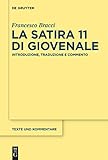La satira 11 di Giovenale : Introduzione, traduzione e commento / Francesco Bracci.
Material type: TextSeries: Texte und Kommentare : Eine altertumswissenschaftliche Reihe ; 48Publisher: Berlin ; Boston : De Gruyter, [2014]Copyright date: ©2014Description: 1 online resource (230 p.)Content type:
TextSeries: Texte und Kommentare : Eine altertumswissenschaftliche Reihe ; 48Publisher: Berlin ; Boston : De Gruyter, [2014]Copyright date: ©2014Description: 1 online resource (230 p.)Content type: - 9783110371130
- 9783110386110
- 9783110369397
- 480
- online - DeGruyter
- Issued also in print.
| Item type | Current library | Call number | URL | Status | Notes | Barcode | |
|---|---|---|---|---|---|---|---|
 eBook
eBook
|
Biblioteca "Angelicum" Pont. Univ. S.Tommaso d'Aquino Nuvola online | online - DeGruyter (Browse shelf(Opens below)) | Online access | Not for loan (Accesso limitato) | Accesso per gli utenti autorizzati / Access for authorized users | (dgr)9783110369397 |
Diss. 2012.
Frontmatter -- Ringraziamenti -- Indice -- Introduzione -- 1. Unità e tema del componimento -- 2. La satira 11 e Marziale -- 3. La satira 11 e l’invito a cena -- 4. Il modello oraziano e i suoi limiti -- 5. La satira 11 e il moralismo romano -- 6. La satira 11 e il quarto libro di Giovenale -- 7. I rapporti con la satira 5 -- 8. Il testo e le interpolazioni -- Testo e traduzione -- Commento -- Bibliografia -- Index rerum
restricted access online access with authorization star
http://purl.org/coar/access_right/c_16ec
Juvenal has long been known as the poet of indignation, a view based mainly on his early satires. His later work had been relatively overlooked until recently. The present commentary is meant to be a contribution to the reappraisal of the later part of Juvenal’s career, a significant trend in the juvenalian scholarship of the last decade. Among the topics addressed there are the relationship between Juvenal and Martial, his position within the tradition of Roman satire, his relationship with the cultural discourse of Roman moralistic literature, the intertextual links with satire 5 and the vexata quaestio of the literary or authentic nature of Juvenal’s work. The author denies a strong break between the early books and the 4th and satire 11 in particular, advocating the idea of a gradual evolution rather than a radical conversion. In the commentary the reader will find a comprehensive analysis of textual problems and stylistic features, in a historically comparative light, with early Juvenal, other satiric poets and Martial as the chief objects of comparison.Realien are also devoted close attention. The volume will thus be a useful tool for scholars and students interested in latin satire and poetry, and also for historians of roman society in the early imperial age.
Issued also in print.
Mode of access: Internet via World Wide Web.
In Italian.
Description based on online resource; title from PDF title page (publisher's Web site, viewed 28. Feb 2023)


